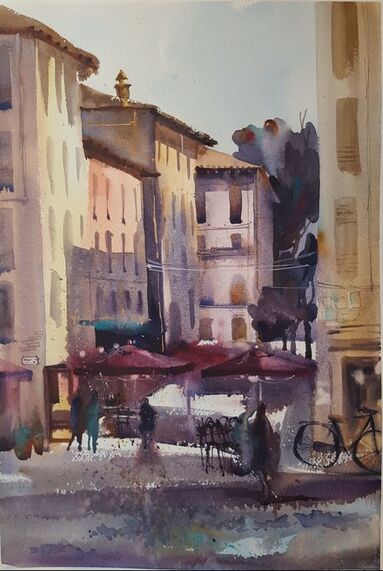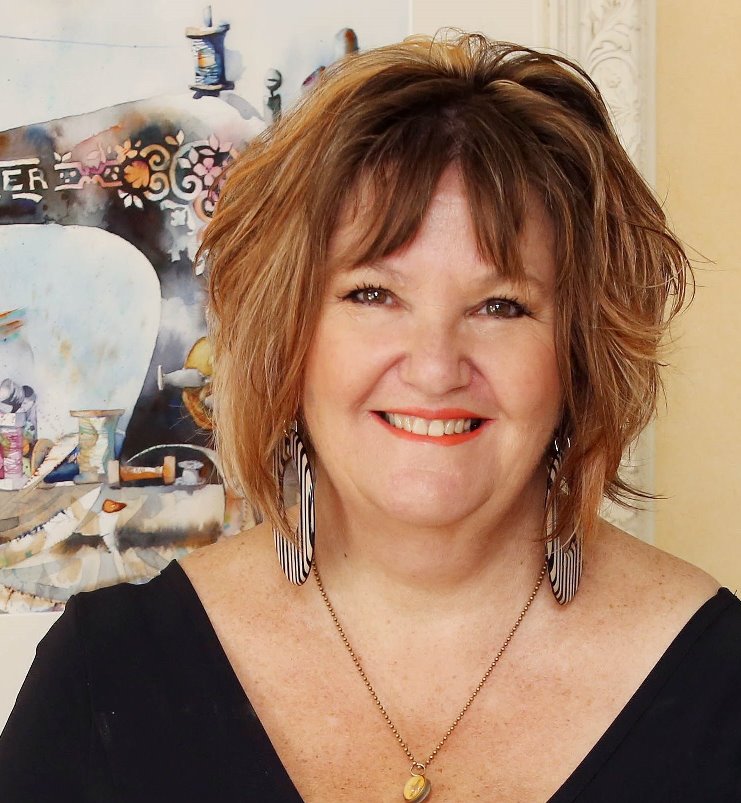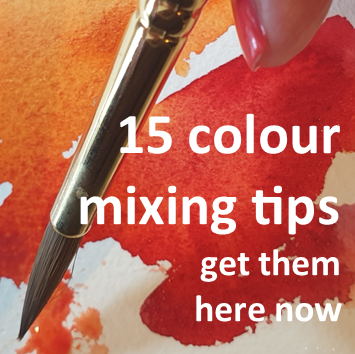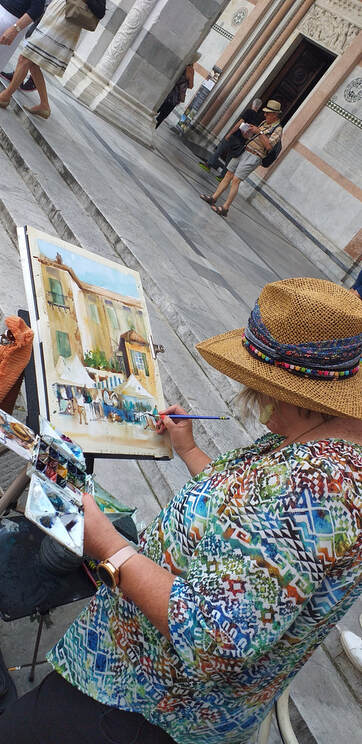
There’s nothing easy about painting watercolour en plein air but, for me, it is an exhilarating and fun experience.
My early attempts, however, were difficult and my paintings absolutely atrocious! It seemed to take me forever to get to grips with this new style of painting in the great outdoors. Without realising, I was faithfully following the 80/20 rule, 80% observation 20% drawing /painting. Later it dawned on me: this rule does not apply to painting watercolour en plein air - I was trying to follow a guideline for the constant situation of studio/observational drawing. When painting in the field, from the time you select your subject to your end-game, you have about 1-1.5 hours, 2 hours at most, to capture the subject before light and atmospheric conditions change too much. No mean feat but, if you practice, you will improve every time. Another element to consider is the subject. My first attempts at painting en plein air were with groups of artists who love painting landscapes. For me, it was a big problem. Although I love good quality landscape paintings, I’m not interested in painting them myself. I’m a city girl afterall, I’m attuned to light and shadows bouncing around architecture and the people who inhabit amazing spaces. Just think of Lisa Douglas (Eva Gabor) and you'll have hit your nail on the head! I often tell my students to slow their painting process down but in the case of painting watercolour en plein air, I’m going to contradict myself and tell you to speed up! Speed up so you catch the light and changing conditions, Remember, watercolour is a fast medium. Give yourself 5 minutes, and only 5 minutes, to take photos and sketch 1 or 2 value thumbnails and most importantly, take a mental snapshot. Make your memory work for you and, even if you think your result is "wrong", your work will be formed of the essence of your subject. Perfetto!! What a great excuse to go out and paint it again!! Your next work at the same scene will include different features and details and the next different again. My personal strategy is to map the subject onto my watercolour paper with a 5 minute sketch and then not refer to the actual scene again, even if I have to turn away from it. I am painting my interpretation of the scene not a photograph. Changing light and shadows become mighty confusing and create confusing paintings. Learn the tools you need to assist you:
x
2 Comments
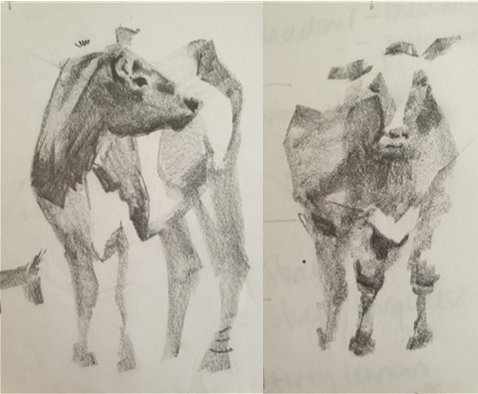 ode to country & western!! ode to country & western!!
edited from my original post 070115
It’s really hard to create a painting about a subject I have no interest in, having said that, I can make myself want to paint a particular subject simply by working through a research process and getting to know and appreciate the subject. Imagine what it would be like for me to be told Country & Western theme ... ?**$#@!!**^?? Guess what? You can get fired up about any subject too!! While I was still working in the corporate world but dabbling in watercolour painting, I was thrilled that my tutor would supply the subject matter. It meant one less thing for me to worry about, all I had to do was turn up every week and she'd have an amazing array of cool stuff she had pulled together for us. Barbara was a tremendous creative facilitator. Another upside to this was that I learned to accept what was in front me, whether I liked it or not, this was no time to be fussing and complaining, I had 3 hours of painting time in front me, better get to it quick! In writing this post I realise too, part of my inspiration for a subject came from our group discussion about the subject and everyone's ideas. Some of my best painting experiences have been painting in a group. The more research I do about a particular subject the more passionate and determined I become to paint it. I fall in love with the subject ... it could be something as simple (?) as a brick wall or the way the light falls on a glass and the shapes and colours it creates. The intricacies of a subject become fascinating, although I don’t paint a lot of detail (this must have been written a while back!), I go through a process of studying the detail and deciding what I will leave out, what to include and which details describe my message best for that piece of art. Typically my research might include a small sketch or two on site as well as a bigger more formed sketch I call a plein air painting. When I’m in my studio, if I’m painting from my imagination, I create lots of doodles and lots of composition thumbnails. I’m reluctant to paint scenes from a photo preferring to paint en plein air, not always possible and although I’m wary, I’m very happy with a lot of them. For me, there is a driving force to create and always has been. Among other creative endeavours, I’ve always drawn and painted. It seems stronger now than ever and I think this may be, in part, because I work as a professional artist creating and painting most days - total immersion is good! My brain is more switched on to looking for subject matter and planning my next work – everywhere I see a painting waiting to be painted. The more I look for subjects the sooner they appear - the more I paint the more ideas I get. Happy painting!! ciao amici!!
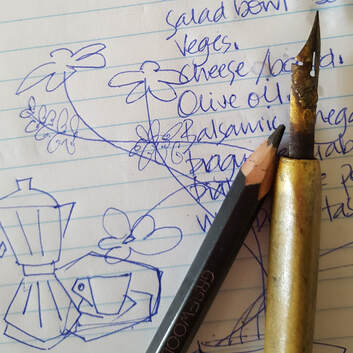
New Students are often fearful of putting the brush to paper. Some people are able to articulate this fear and its foundations, mostly not.
Many students tell me of the harsh and cruel comments they received about their art when they were young. From teachers, parents and friends – some well-meaning, some not, some from overt jealousy. It’s not easy to stop this “stuff”, other people’s “stuff”. It gets in our head and, let’s face it, sometimes we can’t stop it in it’s tracks even as adults. Children don’t always have the same awareness (sometimes they’re better at it than grown-ups!) that perhaps the comments come from an adult’s sad place. Their bad day still affects us, it still hurts, we don’t understand – that’s ok! What I want you to know is, you don’t have to be affected by other people’s fears or opinions. Mostly they’re irrelevant. Your own opinion and pleasure is what matters. As you grow, you will develop your art - learn, love and live your art. The best way to banish fear is to just do it – just paint, no expectations, just enjoy the process and have fun! |
AuthorPaintBox Tips, secrets, random thoughts, Poetry in watercolour is made in the freedom of the here and now. Amanda Brett Inspiration exists, but it has to find you working - Pablo Picasso There are no mistakes in watercolour, just some extra surprises!! Categories
All
What my readers and viewers have to say
Your emails are so informative! I must confess I've watched a couple of your demos from beginning to end, and it makes me want to watercolor!!! I've only ever painted with oil or acrylics and haven't know how to begin with WC. Your content is excellent!
Susan VN Hi Amanda
Thank you for your tips. They inspired me to practise and I realised I haven’t been loading the brush properly. I learnt about adding more paint, and not water, to washes. In today’s tips I like the idea of painting with purpose. Your tips are very helpful. I very much appreciate receiving them. Elizabeth Hi Amanda I enjoyed your post and generous tips. Looked up Dan Burt I begin to see that you can colour any subject to give it pizazz so long as the tone and form is correct Certainly adding value now to my attempts Thanks heaps Annie
Yes very wise words. Agree with not fussing and agree with comments about good quality paint. Well written and inspirational as always. Cheers Janet xxxx Archives
July 2023
Copyright © 2022 All images and text on Amanda's blog and website are the the legal property of Amanda Brett and may not be reproduced without express permission from Amanda Brett or her authorised agent. Thank you for respecting her art and the livelihood of all artists.
|


